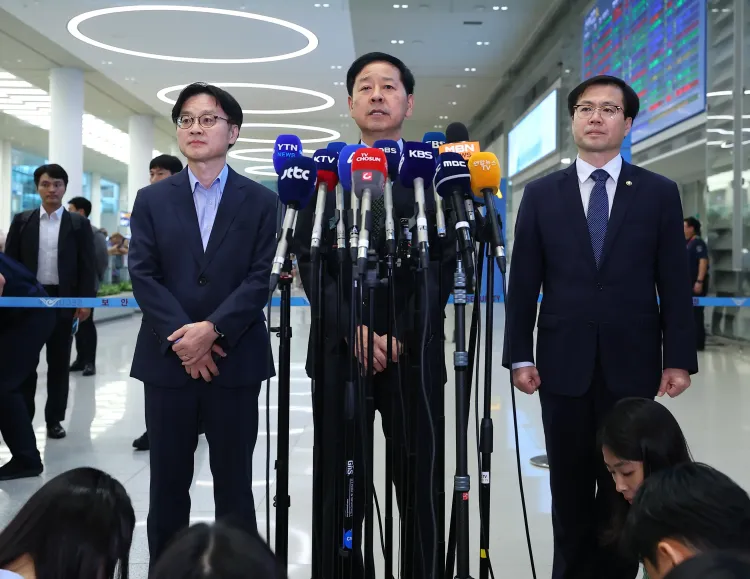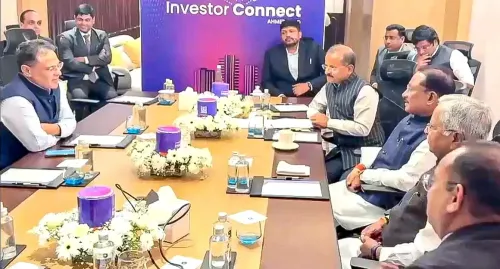Are S. Korea and the US Negotiating for a Win-Win Trade Deal?

Synopsis
Key Takeaways
- Trade negotiations between South Korea and the U.S. are ongoing.
- The goal is to find a mutually beneficial solution.
- South Korea's investment commitment is $350 billion.
- Concerns exist regarding the nature of investments.
- Future energy needs require new nuclear power plants.
Seoul, Sep 17 (NationPress) South Korea and the United States are actively engaged in trade negotiations aimed at achieving a mutually beneficial outcome, as stated by the industry minister of Seoul, who requested patience regarding a deal that could significantly influence Korea's future.
Industry Minister Kim Jung-kwan mentioned that the bilateral discussions have encountered a stalemate but are currently undergoing a dynamic back-and-forth process to devise a win-win solution for both nations. He reassured that the Seoul government would persist in its negotiations with Washington, despite concerns surrounding the framework trade agreement established late in July, as reported by Yonhap news agency.
“The United States today is not the same nation we recognized 10 or 20 years ago. We are dealing with a newly transformed United States,” he expressed during a press conference.
“We are engaged in a challenging ping-pong match... striving to finalize a deal that could benefit both parties,” Kim added, referencing his recent discussions with U.S. Commerce Secretary Howard Lutnick in the U.S. last week.
Per the trade agreement signed on July 30, South Korea committed to investing US$350 billion in the U.S. in exchange for the U.S. reducing its reciprocal tariffs on South Korea from an initially proposed 25 percent to 15 percent, and also lowering tariffs on Korean vehicles from 25 percent to 15 percent.
However, concerns have arisen due to differing views on the details of Korea's investment commitment. Seoul is looking to fulfill its planned investment primarily through loans and credit guarantees, while the U.S. is insisting on direct investments.
“Some worry that the U.S. will absorb the entire $350 billion investment, but that is not how the system works,” Kim clarified, emphasizing that the investment initiatives will also benefit Korean enterprises.
Addressing the notion that Korea should extend financial support to local businesses and accept a 25 percent tariff instead of entering into what some deem an unfair trade agreement, Kim reaffirmed that the government will continue negotiations with the U.S., highlighting that the relationship with Washington may be critical to the nation's future.
When questioned about the recent immigration raid targeting hundreds of South Korean nationals by U.S. immigration authorities, Kim noted that Lutnick promised to address immigration challenges associated with Korean investments in the U.S. during their latest meeting in New York.
“Lutnick expressed regret regarding the immigration raid incident, using the term 'fix,'” Kim recounted.
“It would have been preferable if the immigration raid had never occurred,” he added, mentioning that Washington appeared quite troubled by the situation. “I am aware that the U.S. deputy secretary of state, who visited Korea recently, also expressed regret.”
Kim's remarks come amidst criticism in Korea regarding the U.S. immigration authorities' raid on a battery facility in Georgia, operated by a joint venture between Hyundai Motor Co. and LG Energy Solution Ltd., in early September, which resulted in the detention of more than 300 Korean nationals.
All but one of the Koreans returned home last week under the terms of 'voluntary departure' following their release.
The industry minister emphasized the importance of advancing plans to construct two new nuclear power plants and one small modular reactor to meet future energy requirements.
These projects were confirmed under the 11th basic plan for electricity supply and demand covering 2024 to 2038, finalized in February, although the environment minister recently suggested halting such plans pending a public review.
According to a government reorganization plan announced last week, the environment ministry will expand its role to encompass energy policy responsibilities currently held by the industry ministry.
“As the industry minister, I must assert that we need to develop new nuclear reactors to stabilize energy prices and supply... anticipating energy demand in 2035 and 2036,” Kim emphasized.
Regarding the disputed settlement deal between the state-run Korea Hydro & Nuclear Power Co. (KHNP) and U.S. energy company Westinghouse, Kim revealed that his ministry is investigating the agreement to ensure it adhered to proper procedures, but the situation should be viewed through a business lens.
The industry ministry initiated the investigation after media reports indicated that it might prevent KHNP from bidding on new power plant projects in North America and the European Union, excluding the Czech Republic.








